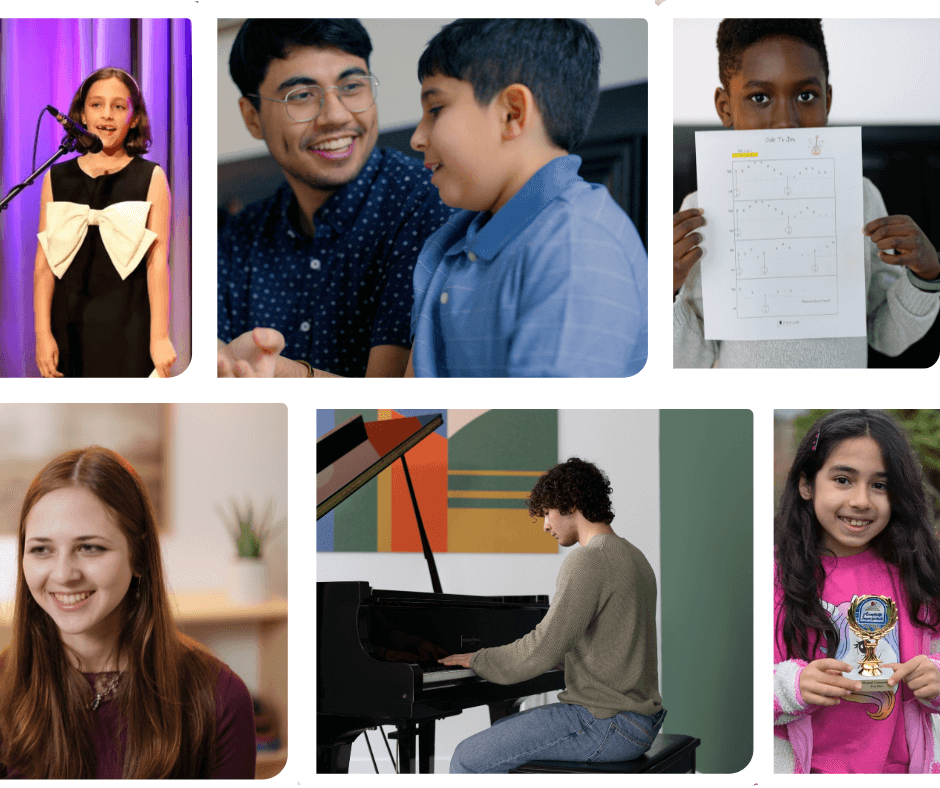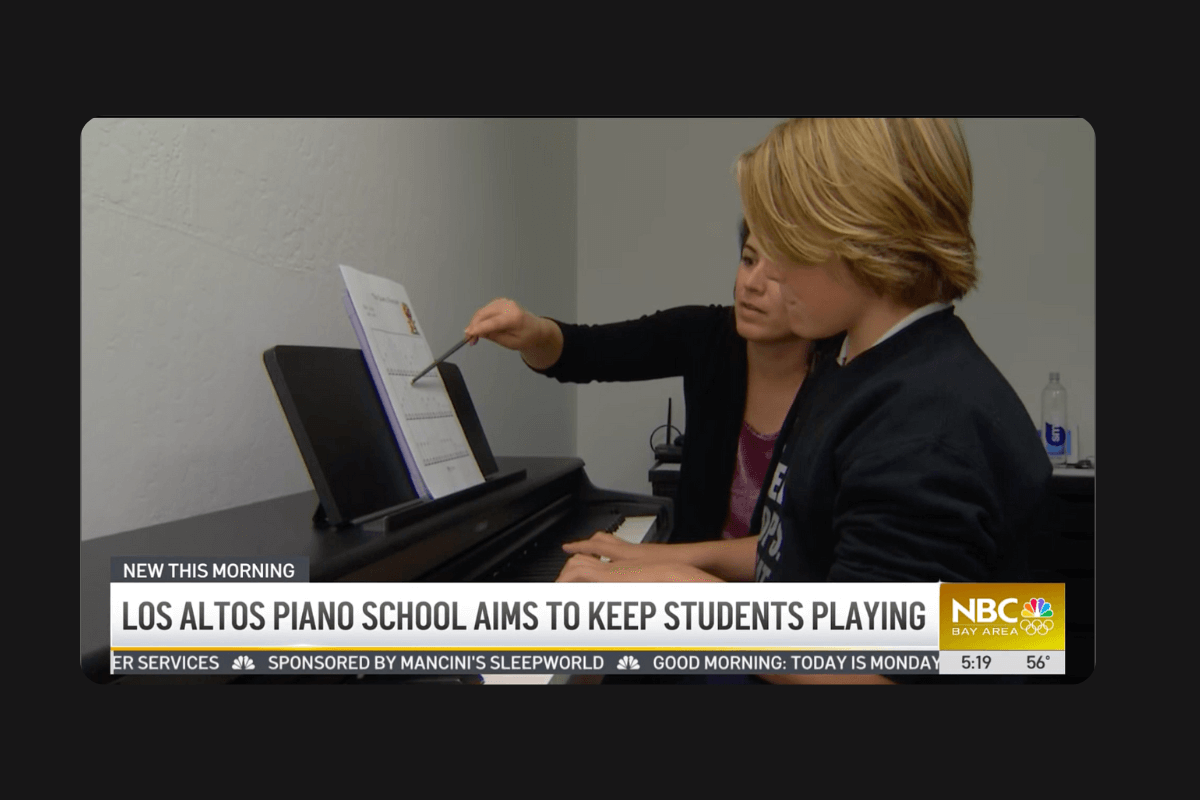Benefits of piano lessons for kids

From building confidence to creative expression, children benefit from the experience of learning to play piano.
As parents, we know learning music is good for our kids. Playing a musical instrument increases a child's appreciation of music and provides various benefits including confidence, maturity, an emotional outlet, and problem-solving skills.
While Payam Music certainly delivers on the standard benefits – cognitive development, improved fine motor skills, better memory – there are other unique benefits to learning to play piano with the Payam Method.
Learning to play piano builds confidence
The Payam Method teaches piano using the psychology of language learning - where students learn how to speak before they can read. Our method starts with our alphanumeric notation — using ABCs and 123s — to build confidence from day one. From the very first level, students develop an understanding of the basic techniques in piano, gaining confidence and learning to play music they love. Rather than start them with intimidating sheet music, students feel confident because they get to use a system of letters and numbers they already know.
Our students learn to play a few songs in their first trial lesson. Not their first month or first quarter, their first lesson. Being able to play the melody of a song they already know is a huge confidence boost for new students. Feeling successful early on helps them take on greater challenges as they progress.
Students feel motivated to learn
Progress is contagious: when students start making progress, they want to make more. Our method builds on musical techniques, just as language learning builds on root words, prefixes, and suffixes. We teach students to master each technique through a piece the students love, allowing them to apply it across multiple pieces. This is very different from traditional lessons where students tend to play the same set pieces over and over again.
Playing a new song breeds curiosity and gives students a sense of accomplishment. Our young students often learn multiple songs in a single lesson. They love running to the printer to grab the next song their teacher hand picked for them based on their musical interests and preferences. Receiving signals that you’re getting better – playing new songs, advancing to a new level, positive reinforcement from your teacher – are all great motivators to keep learning.

Composition and personalization foster creativity
As one of our students told us, “I think a big part of Payam Music is playing the songs you like. I’ve never been forced into some song I wasn’t really interested in. Playing piano is an art form and art isn’t supposed to be robotic. I think trying to stick to the sheet music word for word, that’s robotic in my eyes.”
Memorization and perfection are certainly important skills, but we believe creativity is equally important, if not more important. Piano is an incredible tool for self expression. That’s a big reason we don’t teach from a book and have every student learn the same exact songs. If one student loves fast songs and another prefers slow ballads, they can learn the same technique but in the genre they prefer.
To be clear, it’s not that our teachers don’t teach students how to read and play a song as it's written – they absolutely do. But where things become magical is when students start to compose music themselves. In the age of AI, being able to create something new and original is critical. Anyone can copy and paste. Not everyone can think critically and create an original piece of music. While the classical methodology frowns upon creativity, we teach our students to interpret the music the way that connects with them most. But just like some kids love reading and others love writing, we don’t force composition on any of our students.
Setting goals increases student commitment
Many parents fear practice will be a constant battle and the piano will become a dusty piece of furniture. While we are not draconian about practice, we do see students progress faster when they practice – even with small amounts per week. The teacher gives students guidance on how much to practice but most practice without being asked.
The reason students are motivated to practice is they feel like they are progressing towards a goal. Whether they are learning a new song, advancing to a new level, or practicing for an exam, our teachers help them set and reach their goals. One of our students’ accomplishments that we’re most proud of is the speed to diploma. Diploma is the black belt of the piano world. At Payam Music, 96% of our students reach diploma level in 4 years versus 2% of piano students reach diploma level in 12 years nationally. Achieving diploma is a huge commitment but our students are intrinsically motivated to reach that goal.

Plus playing piano just feels good
Parents tell us that their kids often come home from school and head straight to the piano. It helps them relax, relieve stress, and express themselves. Depending on the speed and intensity of the music, parents can get a pretty good sense of their child’s day.
While our students will certainly gain the standard benefits of playing piano, they will also be more confident, more creative, and more committed to their instrument. They’ll also have the skills to take on hard challenges outside of piano. Learning to play piano is a lifelong skill. Our goal is to inspire our students to fall in love with piano.
Frequently asked questions
Q: What are the main confidence-building benefits of learning piano at Payam Music? A: Payam Music's alphanumeric notation system (using ABCs and 123s) allows students to build confidence from day one by eliminating intimidating traditional sheet music. Remarkably, students can play actual songs from their very first lesson, not their first month or quarter. This early success is a huge confidence boost that motivates them to take on greater challenges as they progress.
Q: How does the Payam Method keep students motivated to practice? A: Unlike traditional lessons where students repeat the same set pieces, Payam Music teaches multiple new songs in each lesson based on the student's musical interests. Students are motivated by seeing progress, learning new songs, advancing to new levels, and receiving positive reinforcement from teachers. Many students practice without being asked because they're excited to master songs they love.
Q: Does Payam Music encourage creativity and composition? A: Yes, Payam Music goes beyond traditional methods by encouraging students to compose their own music. While the classical methodology doesn't allow for creativity, Payam Music teaches students to interpret music in ways that connect with them personally and helps them create original pieces. However, composition is optional: teachers don't force it on students who lack passion for it.
Q: What role does goal-setting play in student success at Payam Music? A: Teachers help students set and reach goals such as learning a new song, advancing to a new level, or preparing for an exam. This goal-oriented approach increases student commitment and practice motivation. The ultimate achievement many students work toward is reaching diploma level, which 96% of Payam Music students accomplish in 4 years.
Q: How does piano learning improve emotional expression and stress relief? A: Parents report that their children often head straight to the piano after school to relax, relieve stress, and express themselves. Depending on the speed and intensity of the music they're playing, parents can get a sense of their child's emotional state. Piano becomes an emotional outlet and therapeutic tool that helps children process and express their feelings through music.




